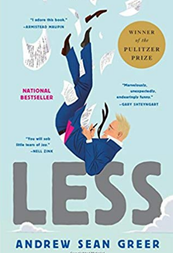A WRITER'S WIT |
My book World

While I admire a number of contemporary fiction writers, I don’t often envy one of them. This may be the book that many a gay author has wanted to write and been unable to do so, including me. It’s that good. So-called gay fiction, with this book, has joined mainstream. This novel is not a coming out story. Our culture is beyond that. Coming out is now something that every gay person must do—whether it takes years or a matter of minutes—the narratives and challenges so similar that how could one write a unique story about it? No, such fiction has advanced to a character named Arthur Less who is about to turn fifty.
Less is a self-described second-shelf writer. Nonetheless, he’s well published and in demand. When his former boyfriend of nine years announces he’s getting married (need I say to a man), Less suddenly checks his drawer for all the opportunities to lecture and teach internationally and RSVPs No to the wedding and yes to the offers. He then cobbles together a months-long tour to five or six countries.
Greer’s structure seems interesting at first. In each new locale, whether it is Mexico, Italy, Germany, or Japan, Arthur Less is thrust into a new life of sorts. At the same time, Less’s old life keeps returning to him in waves, sometimes rushing to the reader in the middle of other thoughts. Yes, suddenly you find Arthur wrestling with some momentous event out of his past. While I can certainly understand Greer’s receiving the Pulitzer Prize (funny, in one bit, Arthur makes clear how it is to be pronounced), I question this structure.
In several key spots in the novel, Greer informs readers that someone other than he is narrating the story. Who can it be? At first, the issue seems unimportant. The story unfolds in the third person, as told by this, as yet, unidentified narrator. I’m not as quick as others; I only suspected halfway through that the narrator was Freddie, the very boy whose wedding Less is avoiding. Okay, I think to myself. That’s fun. All along, Freddie is the one in the know, telling all about Arthur’s around-the-world trip in great detail, yet he has not accompanied Arthur. Oh, of course, at the end (spoiler) when the two men reunite, one assumes that Arthur will reveal all that has happened on his trip to Freddie, but that poses the question: Arthur presumably does not tell Freddie of his trip until after he returns to the U.S., so how can Freddie possibly know all that has taken place? I re-read the beginning to find the exact spot, page eleven, where Freddie begins, ostensibly, to refer to himself in the third person.
Why does Greer structure the novel in this manner? It’s clever, and, I suppose to the casual beach reader, the point of view probably doesn’t matter that much. But why doesn’t Greer just place the novel in the third person anyway or allow Freddie to narrate the novel by way of first person? Does Greer fashion it this way only to be novel, or does he have some other reason for doing so, one I cannot discern?
No matter what, I do love this book and envy it for its grand storytelling. I love Greer’s ease with the proper metaphor at the proper time, the deepening of a certain scene with the proper use of such metaphors. The blue suit. The concept that Less is a bad gay, not a bad writer. The literary allusions that don’t hit you over the head but are part of the fabric of the novel. The gray suit purchased in one country that arrives in the nick of time in another. All these combine to make not only a great read but something of a literary phenom. I now want to read all of Greer.
NEXT TIME: My Journey of States-46 South Dakota



 RSS Feed
RSS Feed